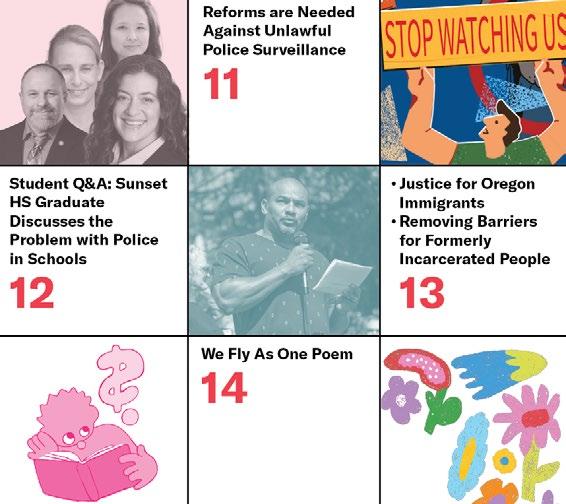

Fall 2023 Magazine
ACLU of Oregon’s Greatest Hits!

ACLU of Oregon Staff

YUSUF ARIFIN — Administrative Intern
JUDE AL-GHAZAL STONE — Associate
ALLIE BALL — Communications & Storytelling Intern
DANIEL BARTZ — Senior Counsel
DENISE CARDER — Finance, HR & Operations Director
KELLY CHEEK — Sr. Finance, HR & Operations Analyst
SANDY CHUNG — Executive Director
AMANDA ELMER — Communications & Storytelling Coordinator
VANESSA GONZALEZ — Administrative & Intake Intern
Check out the ACLU of Oregon’s Greatest Hits timeline and playlist at bit.ly/ACLUHits! Learn about our historical and statewide work while jamming to a throwback playlist of the most popular music from those eras. Engage and respond to our survey for a chance to win a swag bag of ACLU gear.
YVONNE GARCIA — Deputy Director
MARIANA GARCÍA MEDINA
EMILY-GRACE CROPPER-RUSSEL
EMILY HAWLEY — Senior Policy Associate
JESSICA MARAVILLA — Policy Director
CHRISTINA NGUYEN — Communications &





Board of Directors Artists
ODALIS AGUILAR AGUILAR
RICO BOCALA
MAE LEE BROWNING
IMANI DORSEY
CAT HOLLIS
EVELYN KOCHER
RUT MARTINEZ-ALICEA
TAI HARDEN-MOORE
JEANINE MORALES
KENNEDY BARRERA-CRUZ ART DIRECTION
STEPH BIANCO
NAFISA HUTCHINS
ZEE LEONARD


ANGELA NGUYEN
RUDI SZILVASY
2 ACLU Oregon Magazine
















Justice for Oregon Immigrants Removing Barriers for Formerly Incarcerated People 13 • • Reforms are Needed Against Unlawful Police Surveillance 11 Advocates Across Oregon 6 Fighting Fascism 8 Notable Oregon Lawmakers 10 Student Q&A: Sunset HS Graduate Discusses the Problem with Police in Schools 12 People Power is Needed to Protect Public Safety Solutions like Portland Street Response 5 Fundraising in Equity and Social Justice Table of Contents 3 We Fly As One Poem 14 Letter from the Executive Director 4 Staff, Board, Artist Listings Greatest Hits Timeline & Playlist 2 • •
Dear ACLU of Oregon community,


Our world has love and beauty, but it also contains pain and hardship. Across our country, we’re seeing more community members living on the streets. Like you, this breaks my heart.
It’s especially hard when I see a houseless person experiencing what appears to be a mental health or substance use challenge. In these situations, my body activates the “stress response,” the human body’s natural alarm system. When early humans sensed physical danger, their brains flooded with stress hormones, prompting their bodies to fight or flee. Today, our brains trigger the same response during situations that cause distress, fear, and anxiety — even if no physical danger is present.
However, the fear-based reactivity of the flight-or-fight reaction is not conducive to strategic, creative, and openminded engagement, which are the catalysts needed to solve complex, deeply embedded societal issues.



America’s inability to effectively address the challenges of houselessness, mental illness, and substance use is decades in the making. These pervasive societal problems are sustained by immense, powerful systems, including capitalism, racism, and the prison-industrial complex. Power and money-grab policies, like trickle-down economics, have blocked solutions that everyday people need, including affordable housing, accessible health care for all, and jobs with living wages. These policy solutions would go far towards addressing houselessness, while creating many societal benefits.
Although our bodies may naturally activate the fight-or-flight response when we experience the immense injustice of houselessness, the work of justice cannot come out of reactivity and vicarious trauma.
How should we approach the work of justice? We create an Oregon of greater justice, equity, and care by doing the “ACLU” — Act, Challenge, Love, and Unite — together.



We do the “ACLU” by actively supporting the many organizations and people who are working on real solutions guided by respect and love for all our neighbors, including our most vulnerable. Portland Street Response offers a powerful example of the impactful solutions that many Oregonians are creating for our community (more on page 5). Through our emails, website, and social media, we will keep you informed about the important, hopeful, and inspiring solutions-oriented work being done across our state.
ACLU of Oregon community, thank you for continuing to open your hearts and engage in the hard and important work of justice with us. We could not do this work without you.
With gratitude,
 Sandy Chung Executive Director ACLU of Oregon
Sandy Chung Executive Director ACLU of Oregon
Increasingly, policing-oriented groups conflate issues of crime, drug decriminalization and homelessness in Portland. But we know the consequences of fear-based law and order: decades of the “war on drugs” failed. These policies fueled an inhumane and exorbitantly expensive prison-industrial complex. To learn more, go to bit.ly/M110Truth.
4 ACLU Oregon Magazine
People Power is Needed to Protect Public Safety Solutions like Portland Street Response
By Jackie Yerby and Yvonne Garcia

All people, including those experiencing health crises, deserve safety and support. This is the core belief underlying Portland Street Response (PSR) — a team of highly skilled, unarmed behavioral health first responders that provides an alternative to police by assisting people experiencing mental and behavioral health crises.


Studies show that people with mental illness are much likelier to be killed in police encounters. In Portland, the police’s excessive use of unconstitutional force against people with mental health needs led the U.S. Department of Justice to sue the City. Although the City reached a settlement agreement in 2014, it continued to be in noncompliance with the agreement in 2022 — more than 8 years later.
However, solutions exist. Programs like Portland Street Response provide non-police approaches to create real safety for all people in our
communities. Now, we need elected officials to invest in these real solutions instead of being swayed otherwise by police-oriented groups.
Data shows that PSR is highly effective, saving police resources for situations involving imminent threat or danger. In its second year, PSR handled 7,418 calls with only one resulting in arrest. It reduced traditional police responses by 3.5% and non-emergency police responses by 19%. PSR also lessened unnecessary transport to hospitals by providing care on the scene and connected people with supportive resources, including housing, financial assistance, and medical treatment.
Given PSR’s successes, it was extremely frustrating to see Portland City Council — including the commissioner with oversight of this program, Rene Gonzalez — undermining it with limitations like a hiring freeze and unreasonable restrictions on what these first responders can provide on scene.
In response, Portlanders and organizations like the ACLU of Oregon demanded that City Council support PSR. In less than 10 days, over 10,000 people signed a petition asking the Council to establish PSR as a co-equal branch of the first responder network and adequately fund, staff, and resource the program so it can offer effective, 24/7 support across the city. The people’s voice was too strong to ignore. Less than two weeks after the petition was launched, the City agreed to lift the hiring freeze.
Nonetheless, the ACLU of Oregon and Portlanders remain vigilant to ensure that the City continues investing long-term in real public safety solutions like PSR. We encourage you to join us by signing the petition at www. friendsofpsr.com.
5 Fall 2023
Art by Steph Bianco
Advocates Across Oregon





 By Jude al-Ghazal Stone and Amanda Elmer
By Jude al-Ghazal Stone and Amanda Elmer




Collaborating with community organizations across the state is central to our values and to building a more just and equitable Oregon. Here, we highlight a few organizations that do particularly amazing work. Support their important contributions by learning more, spreading the word and getting engaged!


Black & Beyond the Binary Collective (B3C)







Portland, OR
B3C has a strong collective vision of returning power to Black queer and trans communities so they can live joyful and fully liberated lives. This impactful organization “builds leadership, healing, and safety for Black-African transgender, queer, nonbinary, two-spirit, and intersex (TQN2SI+) Oregonians’’ by offering community events, resources, and leadership trainings. B3C’s programs include Umoja Kijana Shujaa — a paid, year-long leadership development youth cohort — as well as financial, housing, and culturally specific mental health support for BlackAfrican TQN2SI+ Oregonians.
Pineros y Campesinos Unidos del Noroeste (PCUN)




Woodburn, OR
PCUN, Oregon’s farmworker union, reflects nearly 50 years of powerful advocacy for Latinx and low-wage-earning communities. Founded by farmworkers, PCUN believes strongly that Oregon’s Latinx working families deserve representation and empowerment in our local government, and supports the people it serves by strengthening the community’s well-being and political advocacy. Honoring the “si, se puede” spirit of Dolores Huerta and Cesar Chavez, this impressive union uplifts working Latinx communities to ensure they have a voice in all decisions that affect them.
6 ACLU Oregon Magazine
Art by Zee Leonard
Oregon


Adelante Mujeres

Forest Grove, OR
Adelante Mujeres, meaning “Women Rise Up,” empowers Latina women and their families through meaningful educational and leadership opportunities. Generations of poverty, racism, sexism, and isolation have limited opportunities for Latinas. Adelante Mujeres is on a mission to change that! This admired organization provides countless life-changing programs such as youth development services, adult education, regenerative agricultural courses, health equity resources, entrepreneurship mentorship, trauma therapy, and more. Support Adelante Mujeres’ work by enjoying the local offerings at their farmers markets in Forest Grove and Cornelius!
Black Alliance & Social Empowerment (BASE)





Medford, OR
Born out of the joy that several Oregonians felt when they attended an all-Black conference, BASE empowers Black residents in Southern Oregon to succeed and thrive. This important nonprofit builds a strong sense of culture and community for Black Oregonians by providing various social events, support programs, and educational resources for people of all ages, from a Black-owned business directory to a scholarship for Black youth. BASE draws on the rich historical tradition of civil rights activists as it moves forward in its work of building a safe, inclusive world for Black residents of the Rogue Valley and beyond.
Rural Organizing Project (ROP)




Cottage Grove, OR
ROP is a statewide organization that supports a multi-issue, ruralcentered, grassroots base in Oregon. ROP is made up of more than 70 volunteer-run and autonomous human dignity groups based in 34 of Oregon’s 36 counties and two tribal communities. From passing immigrant justice legislation to stopping book bans and sharing rural organizing stories via Rural Roots Rising, a monthly radio show and podcast, ROP works to build and support a shared standard of human dignity: the belief in the equal worth of all communities, the need for equal access to justice, and the right to self-determination.
7 Fall 2023
*ROP headquarters is in Cottage Grove and also has 70 groups based in 34 of Oregon’s 36 counties
The ACLU of Oregon team believes that a just, equitable, and caring democracy can only be achieved when civil liberties and rights are honored for all people.

A core part of our work is fighting politicians and groups with a fascist approach to political power. Fascists believe that civil liberties and rights (read: freedom and equality) belong only to those with dominant power and privilege.
To achieve political power, fascists smash truth and replace it with myth: they appeal to the dominant group as victims, casting marginalized groups as the enemy.
Fascism has always been present in the U.S. Our country is built on the violent othering of Black, brown, and Indigenous people, the myth of manifest destiny, and systems that solidified the hierarchy of white, cis-male supremacy. Fortunately, resistance is part of our country’s story, too. Throughout our history, marginalized communities have fought for democracy, significantly expanding all people’s liberties and rights.
Today, though, fascism appears to be gaining
By Sandy Chung
ground. Regressive judges have rolled back protections for pregnant, LGBTQ+, and BIPOC people. Politicians across the country — in Oregon, too — are demonizing transgender people. Everyday people and politicians are stereotyping and vilifying low-income people living on the streets. Immigrants and refugees continue to face attacks.
Ultimately, the fascists’ message is that they will compel America’s return to our mythic history — to “make America great again” — by enforcing the hierarchy of wealthy, white, cismale supremacy.
If fascism wins, we will see a rise in domination and power by the privileged few. That is why we fight so hard for abortion and trans rights; the inherent dignity of all people, including those living on the streets; and protections for immigrants, refugees, and other people marginalized by dominant culture.
We believe in fairness, freedom, and equality. We believe that our democracy can only achieve its promise when it is of, by, and for all the people.
Update: Communities Have the Power to Fight Fascism and Win
Alocal example of a fascist approach to political power lies in Newberg, Oregon, where extremist members of the school board tried to censor symbols of inclusion, belonging, and support for Black and LGBTQ+ students, teachers, and staff.
The ACLU of Oregon took them to court, where we successfully blocked their unconstitutional actions. But teachers, parents, and community members also organized and successfully voted out the extremist school board members to prevent future harm.
Our message for Oregonians is this: the ACLU is here to help, but the most effective way to protect our freedoms is for community members to take collective action. Communities have the power to fight fascism and win.
8 ACLU Oregon Magazine
Newberg
Keep Portland Weird
By Jude al-Ghazal Stone
Growing up as a trans kid in Arizona, I faced discrimination on nearly every front, especially in the healthcare system.

After years of fighting for equal treatment, moving to Oregon was a huge relief. Living in a state that recognizes my basic human rights and doesn’t put me at the mercy of doctors who refuse to provide me with essential health care has helped me flourish in a way I never could in my hometown.
Still, despite Oregon’s strong protections for the LGBTQ+ community, there’s more work to do to guarantee trans people the rights, freedoms, and equality that everyone deserves. Discrimination still exists here, and with the rising attacks on trans rights across the nation,
people and youth in the trans community aren’t safe anywhere. It can be hard to see from Portland, but Oregon isn’t immune to the extremism and hate that has gripped so many states.

It’s no coincidence that enough Oregon state senators obstructed the 2023 legislative session to successfully stop bills that would’ve created stronger protections for genderaffirming healthcare in Oregon, among other important rights. Extremist Oregon politicians — like their counterparts in Idaho, Florida, Texas, and beyond — are trying to gain power by cultivating fear and dividing the community with harmful messaging about transgender people.
Do not be swayed by misinformation and conservative propaganda. Gender-affirming healthcare is a basic human right and an issue of life and death. That’s why I care so deeply about the ACLU’s work to protect trans rights across the U.S. and in Oregon.
United with ACLU National and other state affiliates, the ACLU of Oregon team is fighting hard to protect trans rights in the courts, legislature, and on the ballot. Please join us as we push for an Oregon that will continue its leadership as a defender of LGBTQ+ freedom and equality — and continue being a sanctuary for me and the trans community.
9 Fall 2023
Art by Kennedy Barrera-Cruz
Notable Oregon Lawmakers
 By The Policy Team
By The Policy Team


Our policy team spent a lot of time working with and getting to know state lawmakers over the course of the 2023 legislative session. This year, we’re highlighting a few lawmakers who stood out for their clarity of thinking, principled advocacy, and communitycentered approach. To learn more about all that we accomplished with the support of our coalition partners and ACLU of Oregon members, read our legislative report here and watch this video at bit.ly/legesession or scan the QR code!
Representative Conrad values these words from President Theodore Roosevelt: “The rock of democracy will founder when people in different parties, regions, and religions and races think of each other as ‘the other’ rather than the common American citizen.” For Conrad, democracy means people working together to achieve a common understanding of how to live and interact with each other to the benefit of all.
Conrad embodied this democratic collaboration with House Bill (HB) 2002, a bill that strengthened protections for abortion, genderaffirming care, and healthcare providers. A pro-choice Republican, he initially voted against HB 2002. But he still had questions, so he researched the bill and spoke with stakeholders, including doctors and parents of trans kids. Ultimately, Conrad changed his vote and was the only Republican to support HB 2002.

Fun Fact: At the Knoxville World’s Fair, Olivia Newton-John pulled an embarrassed ten-year-old Charlie Conrad on stage and sang “I Honestly Love You” to him.
Representative Grayber brings her experience as a firefighter and paramedic to her legislative work on disaster preparedness and public safety. A member of the Legislature’s LGBT caucus, Grayber also champions LGBTQ+ policies. In this session, she sponsored our priority bill, HB 2002, to protect abortion, gender-affirming care, and healthcare providers.
During this session, Grayber also served as chief sponsor of HB 2572, which aimed to create tools to address unlawful paramilitary activity. The ACLU of Oregon had concerns about the bill’s potential unintended consequences on lawful First Amendment protest activity. When we spoke with Grayber, she engaged sincerely and tirelessly to address our concerns and demonstrated a genuine commitment to centering constituent viewpoints and finding common ground among differing perspectives.
Fun Fact: Representative Grayber has a beloved rescue dog named Sylvie who loves to stand-up paddleboard and thinks she is a 50 pound lapdog.
Senator Lieber, the first openly lesbian member of the Oregon State Senate, served as this session’s Senate Majority Leader. She led the Legislature’s vital work to protect abortion rights, gender-affirming care, and healthcare providers as chief sponsor of HB 2002, helping successfully navigate the bill through Republican senators’ efforts to block it by not showing up to work and obstructing the legislative process for six weeks.


According to Lieber, this session showed that the Legislature can be responsive to Oregonians: “We all heard the top issues that voters cared about: housing affordability and homelessness, public safety and protecting access to reproductive health care. We acted on all of those priorities and had broad bipartisan support on many of Oregon’s most pressing issues.”

Fun Fact: Senator Lieber is known for energizing the Oregon political establishment with her karaoke events.
Representative Pham champions Green New Deal policies that address the impacts of climate change and inequality. She has also led pro-democracy efforts with bills like HB 2004, which put ranked-choice voting on the November 2024 ballot, and HJR (House Joint Resolution) 30, which would stop politicians from game-playing with quorum requirements and repeatedly shutting down Oregon’s legislature to block environmental, equality, and gun safety policies supported by the majority of Oregonians.
Pham’s background as a community organizer shows up in her lawmaking process. She prioritizes involving constituents and frontline communities in policymaking. Her takeaway from this session reflects her vision and approach: “Even in the face of entrenched political and moneyed power, a small group of determined people speaking the truth can have a big impact.”

Pham’s approach pays off with wins for historically marginalized communities and measurable progress to vitalize our democracy.

Fun Fact: Representative Pham loves to sing karaoke!

10 ACLU Oregon Magazine
REPRESENTATIVE CHARLIE CONRAD District 12, Eastern Lane County
REPRESENTATIVE KHANH PHAM District 46, Outer SE Portland
REPRESENTATIVE DACIA GRAYBER District 28, SW Portland & East Beaverton
SENATOR KATE LIEBER District 14, Beaverton & SW Portland
The Case for Reforms Against Unlawful Police Surveillance
A foundational constitutional principle guarantees each of us the right to express our personal beliefs without unwarranted government interference.
ORS 181A.250 is a critical Oregon law that defends this freedom of expression. The statute prohibits police from collecting or maintaining information on our political, religious, or social beliefs, activities, and associations unless the subject of surveillance is suspected in a criminal investigation.

Unlawful police surveillance is not just a theoretical possibility. Nationally and in Oregon, police have demonstrated persistent patterns of targeting surveillance activities towards racial justice activists, environmental advocates, immigrants’ rights protesters, and those who express sympathy with them. Indeed, historical records show that the FBI and Portland police kept records about the ACLU for many decades because we were considered subversive.

An ACLU of Oregon investigation revealed one reason why police are violating Oregon
surveillance law: police departments and the state do not provide officers with formal training about ORS 181A.250. Over the last year, we requested training materials from thirteen police agencies and the Oregon Attorney General’s office. Ten agencies and the Attorney General’s office responded that they did not have relevant materials, two refused to provide responsive records, and one agency representative replied that he did not “see a reason for surveillance training.”
Our inquiries also revealed that the Oregon Public Safety Academy, which is responsible for certifying and training officers, does not provide instruction on the legal requirements for surveillance in any of its mandated courses.
In fact, instead of making sure its officers comply with ORS 181A.250, the City of Portland tried to change this law during the 2023 state legislative session and is appealing a court order that found its officers violated the law during the 2020 racial justice protests. The ACLU of Oregon was able to stop the proposed
By Rachel Dallal Gale
legislative rollbacks to ORS 181A.250 after dialogue with Portland’s City Attorney resulted in a mutual agreement.
Given police departments’ ongoing violations of ORS 181A.250, the ACLU of Oregon calls on legislators to enact three key reforms. First, the law should be amended to include a cause of action that allows Oregonians to sue police for violating their rights under the statute. Second, evidence collected in violation of ORS 181A.250 should be rendered inadmissible in court. And third, police certification should include mandatory training on legal protections against surveillance, including ORS 181A.250 requirements.
With these reforms, we can curb further abuses and empower Oregonians to embrace their full selves without the threat of unlawful surveillance.
Art by Nafisa Hutchins
11 Fall 2023
Student Q&A: Sunset HS Graduate Discusses the Problem with Police in Schools
 By Yusuf Arifin
By Yusuf Arifin

The ACLU advocates for limiting police presence in schools to promote safe and supportive spaces for all students. Healthy learning environments can only occur when administrators, teachers, staff, and students receive the resources they need to succeed, including restorative justice and counseling services. However, police in schools create more danger and failure, not safety and success.
Indeed, America’s crises of systemic racism, mass incarceration, and the prison-industrial complex start with police in schools. Often referred to with innocuous-sounding terms like “School Resource Officer” or “SRO,” police in schools arrest Black students more than six times as often as white students. SROs also often take police action against students with disabilities, depriving those students of disability accommodation resources that schools are legally obligated to provide.
In response to the racial justice and police accountability movements of 2020, Portland Public Schools (PPS) and other school districts removed police from campuses. Now, to the alarm of many students, parents, and community members, some school districts are looking to reverse course — including PPS.

Below, recent Sunset High School graduate Yusuf Arifin explains how the issue has evolved since 2020.
What have you observed in Portland metro school districts since 2020?
For my entire high school experience, we’ve had an SRO at our school. From many studies and my personal experience, the mere presence of an officer can induce enormous stress and tension, especially for members of marginalized communities. The Beaverton School District recently announced they’re exploring more full-time implementation of officers — although this statement was made quietly and without adequate student input.
How are you working on this issue?
One thing I’ve been trying to do is speak with classmates regarding SROs. Few of my peers know about the policies being implemented that directly impact us. By having honest conversations about our school and district, I feel that I’m able to grow support for common-sense solutions and a greater student voice.
Another aspect I’m focusing on is strengthening oversight of police. Many of the police oversight boards that were established after the 2020
protests have been severely weakened by a lack of community awareness and engagement. Signing up to testify at these board meetings and ensuring the members understand the will of Oregonians is crucial in moving forward in a progressive manner.
Can ACLU-OR members help keep police out of schools?
The ACLU is one of the most effective organizations for explaining student rights and advocating throughout our community. This powerful activism is, truthfully, the work of all of its members whose contributions enable the ACLU to spread its message and overcome resistance from opposite forces. With members’ combined support, our organization can continue implementing changes to improve our community and educate our peers.
Individually, anyone and everyone can make a difference on this issue. Vote in local elections; contact your school board reps. Whether you’re a student, activist, or adult, our school policies should reflect the collective opinion of our community, so please use your voice!
12 ACLU Oregon Magazine
Art by Angela Nguyen
Justice for Oregon Immigrants, Accountability for ICE
By Jessica Lynn Battle
Entering our courthouses shouldn’t involve the risk of racial targeting or law enforcement harassment. Courthouse safety is essential to our legal system’s ability to solicit witnesses, support crime victims, and pursue justice.
Accordingly, a federal court entered a judgment against the U.S. this May, obligating the U.S. to pay our client, Isidro Andrade-Tafolla, $20,000 for subjecting him to an unjustified ICE stop outside the Washington County courthouse.
This hard-fought victory began in 2017 when we attended a vigil calling for ICE to end its harmful practice of courthouse arrests. During the vigil, an ACLU of Oregon legal observer recorded several ICE agents blocking and questioning Isidro and his wife, Renee, as they were leaving the courthouse. Isidro’s story soon galvanized the community.
In 2019, we filed a federal lawsuit with cooperating attorneys at Johnson Johnson Lucas & Middleton for the unlawful stop. In court, ICE agents repeatedly dismissed their actions as reasonably mistaking Isidro’s identity, presenting photos of the man they thought Isidro was. The only visible similarity that Isidro, a U.S. citizen of Mexican descent, shared with the man was their skin color — brown.
The courage of advocates and impacted individuals like Isidro prompted Oregon courts to prohibit warrantless civil arrests in and around courthouses in 2019. In 2021, we also contributed to successful policy efforts in the Oregon legislature to strengthen our state’s sanctuary law and prohibit local law enforcement from participating in ICE’s racist deportation regime.

While it took years for Isidro’s court case to conclude, his story helped catalyze a more just Oregon.
The PCC Clear Clinic Helps Remove Barriers for Formerly Incarcerated People
By Kelly Simon
All people deserve a second chance. After a person has served their sentence for a criminal conviction, they should be able to rejoin our communities without barriers to housing, schooling, or jobs.
However, these barriers exist for 70 million adults in the U.S. — about 1 in 3 people — who have a criminal record that will show up on a routine background check. These public records include information not only about convictions but even dismissals and arrests.
Policymakers, businesses, and everyday people are increasingly recognizing that the most effective way to reduce crime, increase public safety, build stronger communities, and strengthen the economy is to make sure all people – including people rejoining our communities after prison – have access to housing, health care, education, and job opportunities.
To remove barriers for formerly incarcerated people, the ACLU of Oregon has worked on efforts with policymakers so that Oregonians can “expunge” criminal information from their public records. By expunging their criminal records, people can seal or remove certain information from the public record so that it no longer appears in a background check.
Most expungement processes do not happen automatically. Instead, a person with a criminal record has to request that the information be sealed through a court process. Even so, not all types of information can be expunged.
The expungement process may feel daunting, but we encourage community members to seek assistance through the PCC Clear Clinic. Clinic staff provide invaluable resources and support with criminal record expungements and eviction expungements, too.
Fall 2023 13
Isidro Andrade-Tafolla speaking at a rally at the Washington County Courthouse
Art By Rudi Szilvasyi
Grounding Our Fundraising in Equity and Social Justice
For the past three years, the ACLU of Oregon has strived to align our fundraising work with the Community-Centric Fundraising (CCF) movement. Grounded in equity and social justice, CCF offers a working model for fundraisers and donors alike. You can read more about the CCF movement online or by revisiting our previous reflections in our 2021 and 2022 magazines.
This year, we’re proud to share a few of the ways we’ve committed to CCF. During our winter fundraising campaign, we promoted and highlighted our valuable community partners to potential donors. This past legislative session, we shared many volunteer opportunities with you, appreciating that when our supporters commit valuable time towards our collective cause, they make a contribution as significant as a donation — or more!
We’ve also implemented a growing outreach plan to increase opportunities for connection, transparency, and collaboration with you. As a statewide organization aiming to represent Oregon’s vast and diverse communities, we have a deep interest in partnering with our supporters in our work.
We are excited to connect in a variety of ways with as many ACLU of Oregon supporters as we can. In addition to engaging with you through emails and gathering spaces, we want to connect by sharing how our team is learning and growing.
As a fundraising team, we recently explored Edgar Villanueva’s book Decolonizing Wealth: Indigenous Wisdom to Heal Divides and Restore Balance. This ambitious and accessible text helps readers recognize the historical harm of formal philanthropy and accumulated wealth, making room for us to create a new vision of our collective liberation.
By The Development Team



It was deeply challenging and immensely valuable to reflect on our relationship with money, wealth, and privilege, including how our fundraising team can engage with the communities we support in healing ways. We hope you’ll join us as we continue pushing to expand our understanding of money and how we can most effectively use it as a resource for positive change that creates a more just, equitable, and caring Oregon — for and by all of us.
We welcome your reflections as you explore your own relationship to philanthropy, wealth, and what “making a positive impact” means to you! Share your learnings and experiences with us at development@aclu-or.org and consider taking action or making a donation today to support the critical work of the ACLU of Oregon.

14 ACLU Oregon Magazine
We Fly As One
By Allie Ball
The state of trees and all things green
The state of dreams and endless possibilities
The home away from home as those seeking safety
Are met with love and peace as far as the eye can see
The beauty that Oregon holds shall never die
So long as we don’t deny the hurt that is being caused
If you don’t show up for the people
The results could end up being lethal
As soon as we stop passing policies
We stop showing up for democracy
And when we stop showing up for democracy
We stop fighting for equality
Equality for a woman to make her own choice
Equality for the voiceless to finally have a voice

Now more than ever the people who reside in the state of dreams
Need to come together and believe
That we are better off not flying on our own
But flying together towards a future that is bright
A future where we don’t stop the betterment of society from taking flight
Oregon has always been the home away from home
The place where everyone and everything can grow
The place that other states look to
The place that people don’t just simply pass through
But rather envision a life where they can thrive
Oregon,
The state of trees and all things green
The state of dreams and endless possibilities
The state that works to embody democracy
So all people can succeed
The state that works towards a better tomorrow
That allows the seeds of hope, love, and democracy to grow

15 Fall 2023
FREE POSTER & POEM - CUT ME! FREE POSTER & POEM - CUT ME! FREE POSTER & POEM - CUT ME! FREE POSTER & POEM - CUT ME! FREE POSTER & POEMCUT ME! FREE POSTER & POEMCUT ME! FREE POSTER & POEMCUT ME! FREE POSTER & POEMCUT ME! FREE POSTER & POEMCUT ME! FREE POSTER & POEMCUT ME! FREE POSTER & POEMCUT ME! FREE POSTER & POEMCUT ME! FREE POSTER & POEMCUT ME! FREE POSTER & POEMCUT ME! FREE POSTER & POEMCUT ME! FREE POSTER & POEMCUT ME! FREE POSTER & POEM - CUT ME! FREE POSTER & POEM - CUT ME! FREE POSTER & POEM - CUT ME! FREE POSTER & POEM - CUT ME!
Art by Kennedy Barrera-Cruz
AMERICAN CIVIL LIBERTIES UNION OF OREGON



P.O. Box 40585
Portland, OR 97240-0585
aclu-or.org
Support our work through the Give!Guide by making a contribution from November 1 through December 31, 2023 and receive incentives for your giving!








Check out our Give!Guide profile and mark your calendars for the upcoming Big Give days by following the QR code or by visiting bit.ly/aclugive. We invite you to learn about over 200+ nonprofits featured alongside us in the Give!Guide that help make our community vibrant and healthy! Thank you for including the ACLU Foundation of Oregon in your end-of-year giving!

NON PROFIT ORG US POSTAGE PAID PORTLAND OR PERMIT NO 1887 ACLU Oregon Magazine — Fall 2023



































 Sandy Chung Executive Director ACLU of Oregon
Sandy Chung Executive Director ACLU of Oregon








 By Jude al-Ghazal Stone and Amanda Elmer
By Jude al-Ghazal Stone and Amanda Elmer






























 By The Policy Team
By The Policy Team











 By Yusuf Arifin
By Yusuf Arifin




















